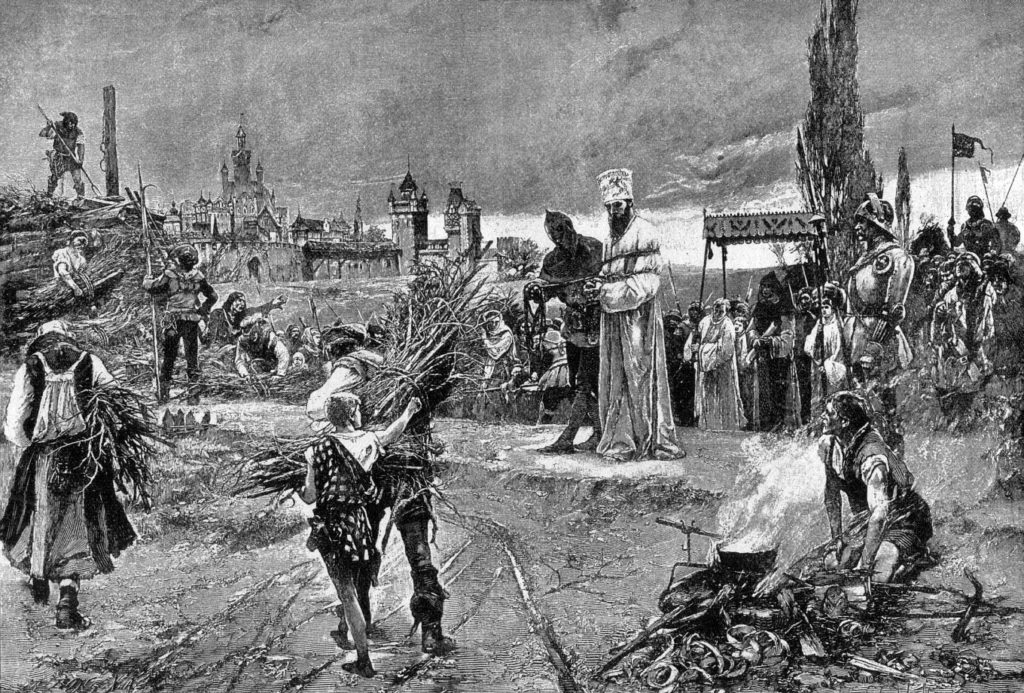Reformation Day History
The Forerunner of Protestantism | John Wycliffe
The Forerunner of Protestantism
In the 16th century, the majority of Europeans were Roman Catholics. The Catholic Church believed in sacerdotalism, the idea that priests were the essential mediators between God and humankind, and that salvation was granted by the Church through sacraments of the priesthood. However, some individuals, such as theologian and preacher John Wycliffe, rejected Catholic teachings after studying the scriptures. Wycliffe disapproved of purgatory, the selling of indulgences, and praying to saints, and believed that all Christians should rely on the Bible instead of popes and clerics. Wycliffe’s vision, goal, and desire was that people should be allowed to read the Bible in their own language, and oppose the tyranny of the Roman church that threatened anyone possessing a non-Latin Bible with execution. In May 1415, Wycliffe was declared a heretic before the Council of Constance and was banned for his writings. He was excommunicated and considered an early forerunner of Protestantism. Approximately 43 years after his death, the Council decreed that Wycliffe’s works should be burned, and his bodily remains should be removed from what they believed was consecrated ground. Wycliffe’s corpse was exhumed and burned, and the ashes cast into a river.
John Wycliffe (Pre-Reformation)

John Hus (The First Reformer)
The First Reformer
John Hus, another early reformer, followed in Wycliffe’s path, and was burned at the stake in 1415 for refuting the doctrines of the Catholic Church. Hus wanted people to read the Bible in their own language, and opposed the tyranny of the Roman Church. Hus’s death inspired John Wycliffe, who said in his final words, “In 100 years, God will raise up a man whose calls for reform cannot be suppressed”. Almost exactly 100 years later, in 1517, Martin Luther nailed his famous 95 Theses of Contention into the church door at Wittenberg.
During this time for many, it was one of the brightest moments in Bible history but for Luther this was a dark time of depression. Luther protested against the sale of indulgences and other corrupt practices of the Catholic Church. He translated the New Testament into German, allowing ordinary people to read the Bible for themselves. Luther was inspired by the biblical verse of Ephesians 2:8 “saved by grace through faith” and was said to be troubled by evil spirits and demons while translating. Despite Luther’s struggles, his translation of the Bible was a significant moment in history and paved the way for the celebration of Reformation Day on October 31. Today, people around the world have the opportunity to read the Bible in their own language, thanks in part to Luther’s efforts.
The early reformers rejected the Catholic Church’s sacerdotalism, and believed that salvation could only be granted through faith in Jesus Christ. They also believed that everyone should be allowed to read the Bible in their own language. These beliefs led to the Protestant Reformation, which was a movement that aimed to reform the Roman Catholic Church. The Reformation had a significant impact on the Christian Church, and resulted in the establishment of various Protestant denominations.
Published 2015/08/08, Updated 2023
Church Listing
- What is the church’s statement of faith?
- Which church confession does the church hold to?
- Are the views of the pastor/church complementarian or egalitarian?
- Is the church structure led by one CEO pastor or a plurality of pastors?
- Does the pastor preach topically, expository, or both?
- As a pastor, which Christian authors have had the biggest impact on your life, beliefs, and ministry?